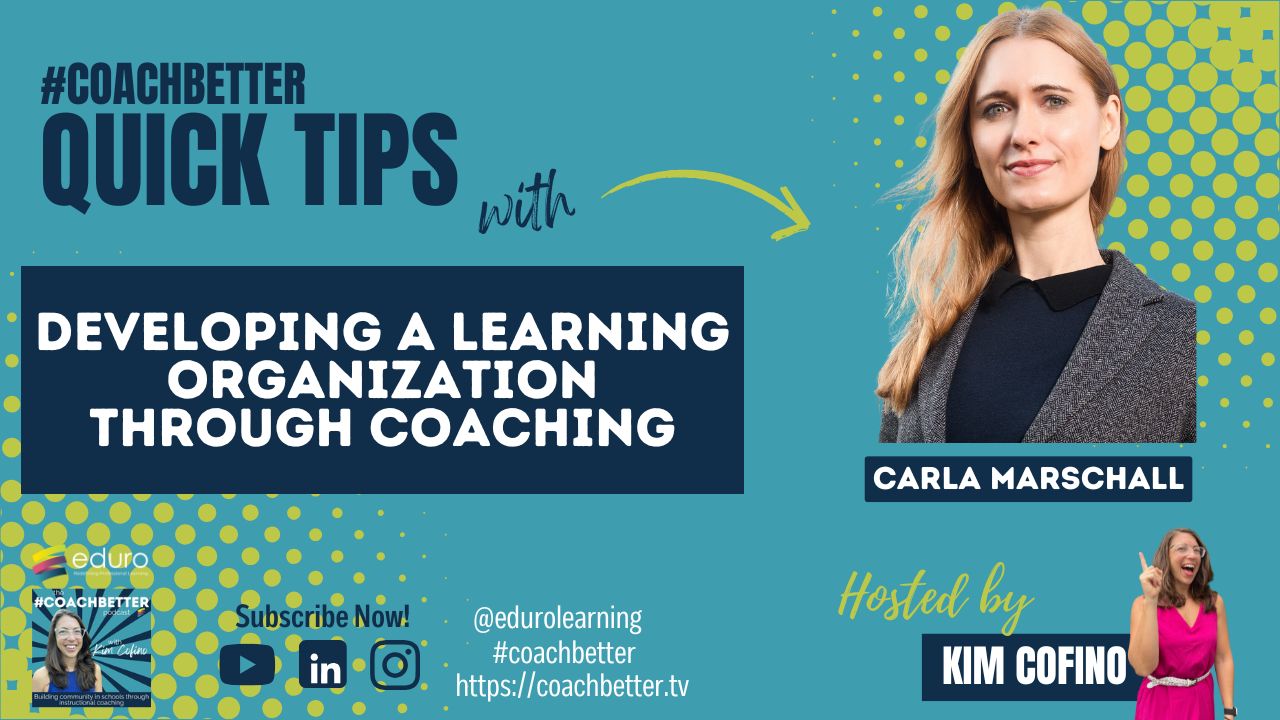All schools are learning organizations, right? Learning is what we do.
But how do we build a culture of learning within our organizations? And how can we leverage coaching to create that kind of environment?
Waaaay back on the #coachbetter podcast, during her first interview, Carla Marschall, currently Head of School at Dresden International School, introduced me to the concept of systems thinking (and I realized I had owned Peter Senge’s book, The Fifth Discipline, for many years, but hadn’t read it yet).
The idea of systems thinking is threaded through everything that we share here on the podcast, because the act of coaching needs to be part of the system to be sustainable.
This episode goes a little deeper into that topic. Carla describes the ways that coaching can shape the culture of a school, when we think about the school as a system, rather than a hierarchy. (This is a highlight from one of my favorite episodes from a previous season.)
If you’ve been thinking about how to build a coaching culture, this episode highlights how to truly embed coaching into the fabric of your school. As I often say on the show, building a coaching culture is so much than just hiring coaches, we have to be intentional in identifying how the existing systems and structures that already exist in the school will embrace coaching.
Here are a few recent episodes that feature this idea:
- Creating a Sustainable Coaching Culture
- 3 Steps to Growing a Thriving Coaching Culture
- Making Instructional Coaching Sustainable with Ellen and Bruce Eisenberg
- Untangling Instructional Coaching, Evaluation & Appraisal with Samantha Olson-Wyman and Stephanie Cifuentes
If this is a conversation you’re having right now with your school leaders, make sure to download our free Leadership QuickStart Guide which features many quotes from school leaders here on the podcast (like Carla) that will help you advocate for coaching in leadership language today!
What’s YOUR level of coaching mastery?
All coaches go through various stages of coaching mastery. Once you identify where you’re at, you can begin to build the skills needed to move to the next stage.
This quiz is based on real-life case studies compiled from years of working with coaches inside The Coach Certificate & Mentorship Program!
When you receive your results, you’ll also get your matching case study from the STRIVE Case Studies to see where you fit in the stages of coaching mastery.
Ready to tackle your challenges and move on to the next level in YOUR coaching practice?

The STRIVE Model of Coaching Mastery quiz will help you identify your level of coaching mastery by matching you with case studies compiled from years of working with coaches inside The Coach Certificate & Mentorship Program so you can easily see where you fit!
When you complete the quiz, you’ll get:
- Your matching case study,
- Specific strengths & challenges aligned to your result;
- Suggested next steps for each stage;
Plus the Case Study Document includes:
- Case studies leveled by coaching mastery;
- A framework to identify essential stages of professional growth & key areas to focus on in your professional learning;
- Alignment with the THRIVE Model for a Successful Coaching Culture;
- Space for you to reflect & prioritize so you can take action immediately!
You’ll go straight to the Quiz, and get the Case Studies by email.
Developing a Learning Organization
You need an umbrella under which coaching fits. Coaching shouldn’t be a standalone support. Framing it as “we are a learning organization” (using Peter Senge’s definition: “the ability of the organization to build its capacity to reach its highest vision of self.”). This is a tool for us as an organization to grow in order to meet our mission and vision that we hold so dear. With that umbrella then we have strategies that we use to develop ourselves as a learning organization. Coaching is one of the things we use to meet our goals.
We are developing ourselves as systems leaders where we begin to understand the interactions between people, parts, policies, curriculum. Everything else in our organization is also key to developing ourselves as a learning organization because we can find those leverage points from which we can create systemic change. So coaching is one thing. Systems leadership is another thing. We have to ask ourselves, “Why are we going to do coaching?” It allows us to really listen to each other, pose really strong questions, develop ourselves, without judgment or advice. You know, it’s coming from ourselves and, of course we might choose to collaborate as opposed to coach, but we do want to create those opportunities where there’s strong psychological safety where people feel like they can take risks.
One of the premises of systems thinking is that you can not control a system, it’s not hierarchical (it’s a circle shape, not a triangle). You know, when you think of a hierarchy, you know, and it goes from the most people at the bottom and then it up to the, to the top kind of thing. So it’s not a hierarchy, it’s a circle where there are lots of interactions and connections between people and parts within an organization. If you want to make change in an organization, you have to think about how the interactions between individuals in the organization relate back to the aims or the purpose of the organization. When we build a coaching culture and people change the way they interact with each other as individuals, that creates a ripple effect across the whole organization because it changes the culture.
You have a fundamental shift from a transactional way of interacting to a more meditative way of interacting. That changes the way people think and also then how they interact with their work as a practitioner, as an educator. Coaching enables us to create lots of agents of change that are autonomous and who are doing good work through deep listening, paraphrasing, posing questions. Through that it shapes a culture that builds openness to reflection on practice to growth. and that’s the process of transformation of a system, which shapes the culture of an organization.
Watch the Video
Key Takeaways for Instructional Coaches
I truly appreciate this conversation because no matter where you are in your coaching journey, you need to be prepared to advocate for coaching. Even brand new coaches can often end up being the only one in their school setting who truly understands the value and purpose of instructional coaching.
That’s why we include coaching advocacy in ALL of our courses for coaches – at the level that’s right for your experience.
If you’re curious to learn more, check out one of our previous videos on this topic,
- Embracing Your Influential Leadership as an Instructional Coach
- Two Ways Instructional Coaches are Leaders
- Coaching Skills Aren’t Just for Coaches: Coaching As Leadership
Each of our three global cohorts will help you take the next step in your coaching advocacy – either as a brand new coach in Getting Started as an Instructional Coach, or as a current coach in The Coach Certificate and Mentorship Program, or as a coach who’s ready to lead in Coaches as Leaders.
Find all the details about all of our courses for coaches at coachbetter.tv/learn and select the course that’s just right for your current experience level.
Free Workshops for Instructional Coaches
If you’re ready to keep learning, try one of our FREE workshops where you’ll be able to dig deeper into the concepts in this post, and get a peek at all of our courses for coaches.
We have workshops (and courses) to support coaches at every stage of their career: from new and aspiring coaches making the move from classroom to coach; to current coaches ready to be more intentional and strategic in their practice; to established coaches leveraging their coaching experience to lead.

You can them all on our coachbetter website at coachbetter.tv/workshops
If you’re curious right now, you have questions, please reach out. You can leave a comment below, join our #coachbetter Facebook group, or find us on social media at Eduro Learning and send me a DM. I’d love to support you on your coaching journey. See you next time!
Connect with us!
Subscribe to the podcast iTunes |Spotify|Stitcher
Follow us on social media: Instagram |LinkedIn
Join our #coachbetter Facebook group

Recent Comments